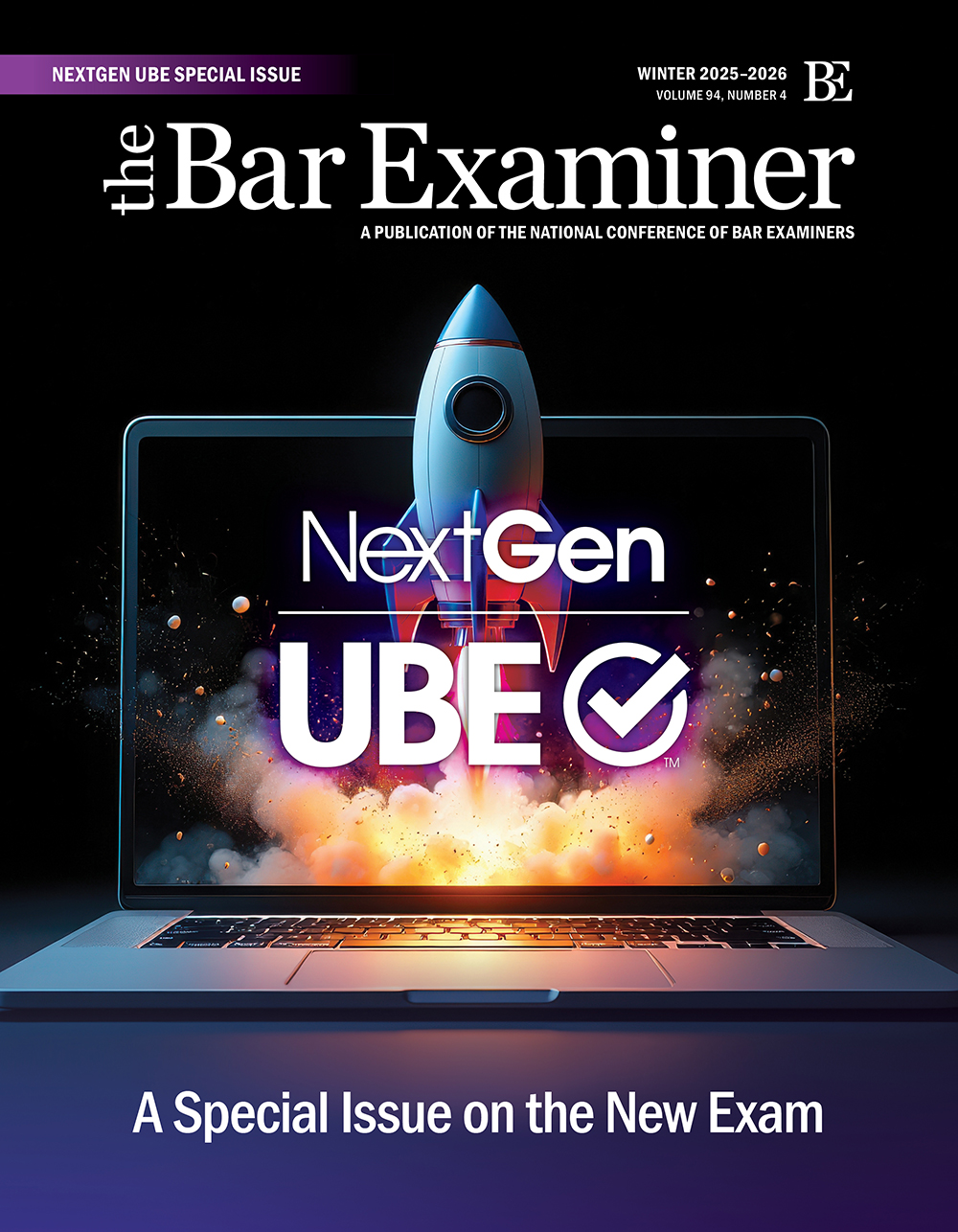This article originally appeared in The Bar Examiner print edition, Summer 2022 (Vol. 91, No. 2), pp. 19–22.By William E. Adams, Jr., and Leo P. Martinez
A series of articles on topics of immediate significance to the bar admissions community.
DIVERSITY SERIES: Diversity in the legal profession and efforts to enhance the participation and success of underrepresented and/or historically disadvantaged groups in legal education and bar admissions.
The Council of the Section of Legal Education and Admissions to the Bar of the American Bar Association (ABA) is the recognized accreditor of American law schools by the United States Department of Education.
The Standards and Rules of Procedure for Approval of Law Schools, published by the ABA Section, detail the Council’s requirements that a law school must meet to obtain and retain ABA accreditation. Many jurisdictions limit eligibility for bar admission to graduates of ABA-approved law schools.1
The Curriculum Standard of the Standards and Rules of Procedure for Approval of Law Schools, Standard 303, has historically prescribed coursework that the Council believes should be required for persons graduating from law school. At the Council’s August 2021 meeting, after a lengthy process that included multiple efforts to seek comments and input from a variety of stakeholders, the Council approved recommendations to revise Standard 303 to strengthen curricular requirements regarding diversity, equity, and inclusion.
The revised Standard 303 requires schools to provide education on bias, cross-cultural competency, and racism twice in a law student’s career—first at the start of the program of legal education and again before graduation. It also requires students engaged in law school clinics or field placements to have the second experience before, concurrent with, or as part of the clinic or placement.
Relevant parts of the revised Standard are shown in the sidebar. This article outlines the process by which the revisions were made and discusses some of the comments received.
Recommended Amendments and Council Approval
The Standards Review Committee of the Section of Legal Education and Admissions to the Bar is charged with reviewing proposed changes or additions to the Standards, which are then referred to the Council for review and recommendations. At the Council’s August 2020 meeting, the Council reviewed and approved the Committee’s Proposed Standards Agenda for 2020–2021.2 The agenda stated that the Committee, in consultation with the Council Chair and the Managing Director, had identified diversity, equity, and inclusion, including curricular requirements regarding bias and cultural competency and concrete actions, as among its goals for the year.
At its May 2021 meeting, the Council recommended amendments to Standard 303 that added educational requirements on bias, cross-cultural competency, and racism. The revisions to this Standard were added in part due to input from various groups and individuals, including a letter from 174 deans and the work of individuals such as Professor Kimberly Norwood, who served on the ABA Commission on Racial and Ethnic Diversity in the Profession. Other input resulted from an October 2020 group of roundtables hosted by the Council on various topics, of which two roundtables were invited to discuss diversity, equity, and inclusion and how the Council could help enhance these goals.
As the ABA Standards review process requires, these amendments were released for public comment in May 2021. Several especially constructive comments were received, and the Standards Review Committee made revisions as a result.3
At its August 2021 meeting, the Council approved the recommendations with minor edits and included Interpretations to provide guidance and address any confusion over how the new Standard would be implemented.
House of Delegates Approval and Law School Compliance Timeline
The next procedural step in the Standards approval process is for any new or revised provisions to be submitted to the ABA House of Delegates for its concurrence. It’s important to note that the Council, not the House of Delegates, is the final accrediting body. United States Department of Education regulations require that the accreditation function carried out by the Council be independent of the ABA’s governing body.4 The proposal to amend Standard 303 was submitted to the House at its meeting during the February 2022 ABA Midyear Meeting. The House concurred with the changes by a vote of 348 for and 17 against.
Although technically amendments to the Standards become final when House concurrence occurs, the Managing Director’s Office has often given law schools additional time to implement any changes resulting from concurrence that happens in February so that compliance is not required until the fall term. Because the changes to Standard 303 may result in the creation of new courses at some schools, an often time-consuming process, the Managing Director’s Office is requiring law schools to have a plan in place by fall 2022 as to how the law school plans to comply with full implementation of the Standard by fall 2023.
The Council’s Interpretations Address Public Comment Concerns
As noted above, several comments were submitted regarding the original version of the amendment to the Standard during the public comment phase in May 2021. Among the concerns commenters raised were that the requirements posed potential interference with law school curricula and would result in imposing certain ideological viewpoints that stifled dissent, with possible implications in terms of academic freedom and the First Amendment. There was also concern that the Council was mandating implicit bias training. Some commenters also questioned the effectiveness of such training and attempts to teach about racism and bias.
The Council’s Interpretations to Standard 303 (shown in the sidebar) attempt to guide schools in implementation as well as address the concerns and misunderstandings expressed by commenters about the intent of the Council. For instance, Interpretation 303-7 lists some examples that could satisfy the Standard. As indicated by the Interpretation, the examples listed are not meant to be exhaustive. The Council expects schools will take a variety of approaches to satisfy this requirement, including methods not mentioned in the list of examples. The examples in Interpretation 303-7 include methods other than classroom instruction in the form of courses and clarifies that a course is not required.
Also, the word “training” was removed from the original proposal to make clear that implicit bias training is not a requirement of this Standard. The Council also clarified that the requirement for clinical or field placement students can be met before, concurrently with, or as part of the clinic or placement.
As to the concern that the changes would require schools to indoctrinate students, Interpretation 303-8 expressly states that the Council is not prescribing the form or content of the education. Therefore, it has not mandated a particular approach for schools to take in implementing the rule.
Finally, as to the concern that the changes would interfere with academic freedom, schools must implement the Standard’s requirements. Thus, to the extent academic freedom is implicated, no individual professor is required to teach any of the topics in the Standard and no school is required to violate the professor’s freedom to the extent it applies in this situation. The school can choose who will provide the educational opportunities and may even choose a guest lecturer, as noted in Interpretation 303-7. Further, Standard 405, Professional Environment, requires schools to have an academic freedom policy, so application of Standard 303 in a manner inconsistent with Standard 405 would be impermissible.
Standard 303. CURRICULUM
. . .
(c) A law school shall provide education to law students on bias, cross-cultural competency, and racism:
(1) at the start of the program of legal education, and
(2) at least once again before graduation.
For students engaged in law clinics or field placements, the second educational occasion will take place before, concurrently with, or as part of their enrollment in clinical or field placement courses. . . .
. . .
Interpretation 303-7
Standard 303(c)’s requirement that law schools provide education on bias, cross-cultural competency, and racism may be satisfied by, among other things, the following:
(1) Orientation sessions for incoming students;
(2) Lectures on these topics;
(3) Courses incorporating these topics; or
(4) Other educational experiences incorporating these topics.
While law schools need not add a required upper-division course to satisfy this requirement, law schools must demonstrate that all law students are required to participate in a substantial activity designed to reinforce the skill of cultural competency and their obligation as future lawyers to work to eliminate racism in the legal profession.
Interpretation 303-8
Standard 303 does not prescribe the form or content of the education on bias, cross-cultural competency, and racism required by Standard 303(c).
Next Steps for Implementation
As noted earlier, the Managing Director’s Office has provided guidance that will require compliance with the revisions by fall 2023. As the Council undertakes the ongoing site visit process as required by the Standards, it will have the opportunity to review the plans of schools being inspected in 2022 to get a sense of how schools will be implementing the Standard.5 The Council will monitor implementation and will have the opportunity to identify potential issues as a result. As with any new requirement, it will assess whether there are unintended consequences or unexpected circumstances that need to be addressed.
The Council trusts that schools will creatively devise methods to fulfill the new requirements in a way that engages students who will eventually represent clients from a variety of backgrounds and confront these societal issues in their practice. Some schools and legal educational organizations are already planning workshops or sessions at their existing conferences to discuss ways to provide these educational opportunities. The Council believes that law schools are particularly qualified to educate students about the complexities of the issues covered by the new Standard 303 provisions and that they will do so effectively.
Notes
- Editor’s Note: For more in the Bar Examiner about the ABA Section and the accreditation process, see “New to Bar Admissions? What You Might Like to Know About: The ABA’s Connection to Bar Admissions,” 90(1) The Bar Examiner 86–88 (Spring 2021); Diane F. Bosse, “ABA Accreditation: A Symbol of Quality,” 82(2) The Bar Examiner 28–33 (June 2013). (Go back)
- The Committee was at that time named the Standards Review Subcommittee; it was renamed the Standards Review Committee in 2021. (Go back)
- The public comments are available on the ABA Section website at https://www.americanbar.org/groups/legal_education/resources/notice_and_comment/ (see “May 2021 Matters for Notice and Comment – Standards 205, 206, 303, 507, and 508”). (Go back)
- When the Council sends a proposal to the House, the House may concur or send the proposal back to the Council for reconsideration. At that point, the Council may opt to revise or send the same provision back to the House a second time. If the House declines to concur with the proposal, the Council may then choose to revise again, abandon it, or vote to finalize the proposal. The decision to approve, revise, or abandon any Standard or Rule remains the exclusive province of the Council. (Go back)
- The Standards require periodic site visits for law schools that are fully approved, provisionally approved, or seeking provisional approval. Site visits to fully approved law schools take place every tenth year, and those to provisionally approved law schools usually take place each year. (Go back)

William E. Adams, Jr., has served as the Managing Director for the Council of the ABA Section of Legal Education and Admissions to the Bar since 2020. Prior to that, he served for six years as the Council’s Deputy Managing Director.

Leo P. Martinez is Dean Emeritus and Professor Emeritus at the University of California Hastings College of the Law. He is currently a Managing Director at Andersen, the tax and financial services firm. He is serving as the 2021–2022 (through August 5, 2022) chair of the Council of the ABA Section of Legal Education and Admission to the Bar.
Contact us to request a pdf file of the original article as it appeared in the print edition.







